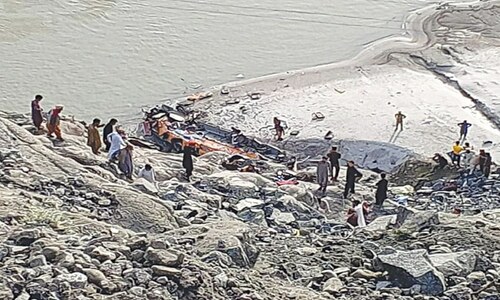ISLAMABAD: Justice Asif Saeed Khosa, the puisne judge of the Supreme Court who headed the bench that decided the Panama Papers case, will commence on Monday (Nov 13) hearing to consider whether or not to open the Rs1.2 billion Hudaibya Paper Mills corruption reference, perceived to be the Sharif family’s Achilles heel.
A three-judge SC bench, headed by Justice Khosa and comprising Justice Dost Muhammad Khan and Justice Mazhar Alam Khan Miankhel, will take up a petition filed by the National Accountability Bureau (NAB) challenging the 2014 Lahore High Court order of quashing the Hudaibya reference.
Moved by NAB Prosecutor General Waqas Qadeer Dar on Sept 20, the petition requested the apex court to set aside the LHC’s March 11, 2014 judgement in the interest of justice, fair play and equity. NAB has also filed in the Supreme Court a separate application seeking condonation of the delay in filing the appeal.
Former prime minister Nawaz Sharif, Punjab Chief Minister Shahbaz Sharif, Shamim Akhtar — mother of Nawaz, Shahbaz and the late Abbas Sharif — Maryam Safdar, Hussain Nawaz, Hamza Shahbaz, Hudaibya Paper Mills, the federal government as well as the judge of the accountability court No IV, Rawalpindi, are respondents in the appeal.
Justice Khosa to head three-judge bench that will consider whether or not to open Rs1.2bn corruption reference
On Sept 15, the NAB prosecutor general had assured the Supreme Court that the appeal against the high court verdict would be filed within the next seven days. Consequently, a five-judge SC bench, headed by Justice Asif Saeed Khosa, had disposed of the petition of Awami Muslim League chief Sheikh Rashid Ahmed that had invited the attention of the apex court to the failure of the bureau to file the appeal.
Sheikh Rashid had preferred instituting the petition in view of an earlier assurance held out by NAB’s Additional Prosecutor General Akbar Tarar on July 21 before a three-judge SC implementation bench headed by Justice Ejaz Afzal Khan that since the Joint Investigation Team (JIT) during its 60-day inquiry had collected additional and fresh evidence against the Sharifs for amassing assets disproportionate to their known sources of income, the bureau was considering filing an appeal in the Supreme Court.
If NAB succeeds in convincing the Supreme Court to accept its appeal, it will mean resurrecting the reference 5 of 2000 and filing it in the accountability court concerned for final decision.
In the reference, the respondents are accused of setting up Hudaibya Paper Mills Ltd to launder money by taking the cover of the Economic Reform Act, 1992. The money was laundered by converting the same into Foreign Exchange Bearer Certificates to be deposited in foreign currency accounts opened in the name of “benamidars” and friends by allegedly forging the signatures of some ostensible account holders.
These foreign currency accounts, the reference alleged, were then utilised by the Sharifs as collateral for obtaining credit lines in the Pakistani rupee for Hudaibya Mills. It also said that Finance Minister Ishaq Dar had helped in opening a number of fictitious bank accounts and carrying out a number of other illegal activities to achieve the objectives for their own benefit.
The reference alleged that the laundered money, shown as share deposit equity of Hudaibya Mills, was used to pay the liabilities of the mill and other allied companies of the group amounting to Rs642.7 million. In addition, another sum of Rs600m was transferred from abroad for final settlement of borrowings from Al-Taufeeq Bank, which was actually owned by the Sharif family, and thus a total sum of Rs1.2bn was allegedly amassed by the family and constituted unexplained income which was disproportionate to their know sources of income.
The high court had on Dec 3, 2012, quashed the reference through a unanimous judgement, but the judges disagreed with each other over permissibility of reinvestigation by NAB into the matter.
This necessitated referring the matter to a referee judge who held on March 11, 2014 that reinvestigation into the case was not permissible because it would mean providing NAB another opportunity ostensibly to fill up their lacunas and equip them with better tools for combating or victimising the Sharifs at the hands of the NAB authorities, which obviously was not the intent and purport of the NAO.
In the appeal, NAB argued that high court verdict was not passed in consonance with the dictums laid down by the apex court. Besides, it added, the referee judge was not competent to set aside the findings of the high court judge in the matter of reinvestigation as had been done in the instant case.
The investigation into the corruption allegation was a continued process to reach a just conclusion and any embargo could not be placed on the fresh investigations or further investigation, especially when new material had emerged, the appeal argued.
NAB could not be debarred or restrained from proceeding further when the JIT had collected incriminating material in the Hudaibya case, the appeal said, adding that it would be appropriate to set aside the high court judgement to the extent of reinvestigation in order to fortify and corroborate the material collected by the JIT.
Published in Dawn, November 11th, 2017














































Dear visitor, the comments section is undergoing an overhaul and will return soon.